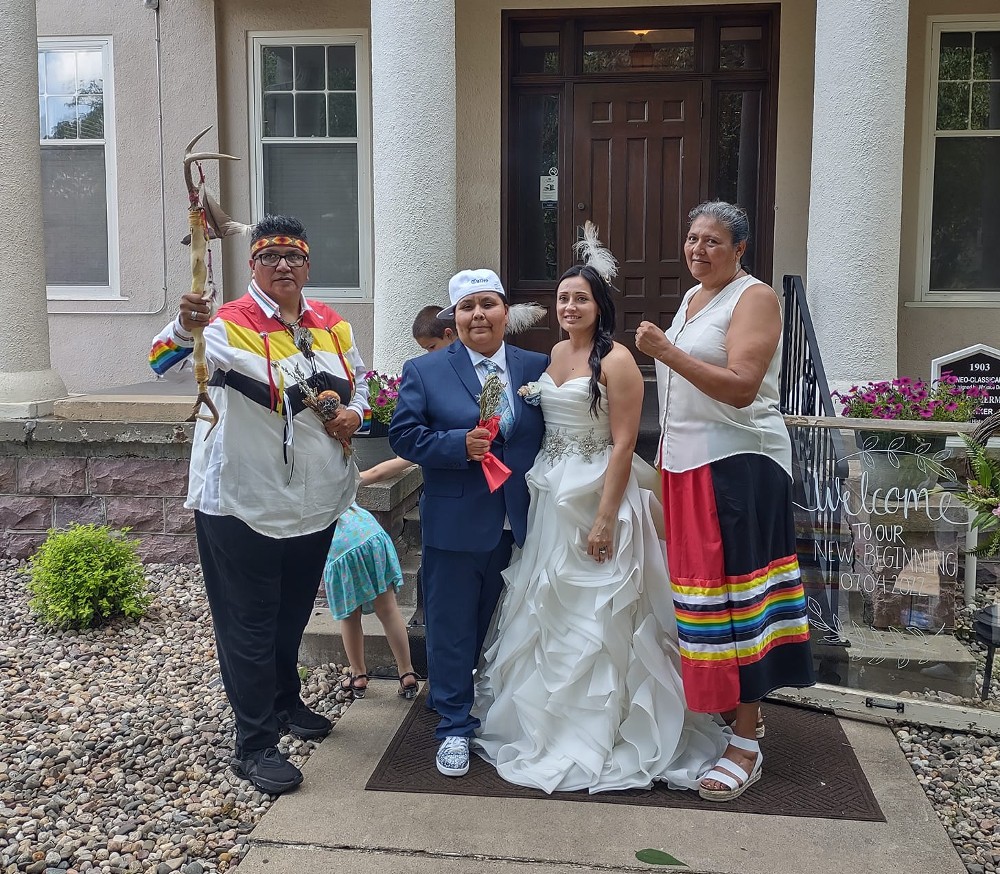
- Details
- By Darren Thompson
Glenabah Roach and her wife Tonya Tulley were married under South Dakota law on July 4, 2022, but Roach’s tribe, Navajo Nation in Arizona, doesn’t offer same-sex marriage. Roach, Navajo and Mniconjou Lakota, and Tulley, Catholic, wanted to arrange a wedding that celebrated their culture and traditions.
Roach’s first choice of someone to officiate her wedding was a close friend of hers, a citizen of the Three Affiliated Tribes in North Dakota, but couldn’t make it because he was scheduled for work on the holiday. Her next choice was a traditional medicine man her mother contacted from the Flandreau Santee Sioux Tribe. “He told my mom he would marry us,” said Roach. “And we spoke over the phone he mentioned he was looking forward to meeting my soon-to-be-husband.”
“I had to tell him that my spouse is my soon-to-be-wife, and he told me he wasn’t sure if they could conduct a wedding ‘like that’,” she said. “He said he had to seek further advice from elders in the community and I never heard back from him.”
“The only thing that we were looking for was someone that was traditional, or spiritual, that was on the right path in life,” Roach told Native News Online. “We wanted the wedding to include both Native American and Catholic traditions.”
So, they were recommended to reach out to “Muffie,” or Monique Mousseau, an Oglala Lakota “minister” recognized by the state of South Dakota who lives in Rapid City.
Roach and Tulley’s wedding was Mousseau’s first, since she became ordained to officiate weddings by the state in 2020.
Mousseau conducts traditional Lakota weddings with the help of her wife, Felipa Deleon.
Mousseau and Deleon were married at the National Marriage Celebration at Mount Rushmore National Memorial on September 6, 2015 with six other couples. They wanted to get married on the Pine Ridge Indian Reservation, but the Tribe didn’t allow same-sex marriages. Same-sex marriage was legalized nationally on June 26, 2015, in a 5-4 vote in the Supreme Court in Obergefell v. Hodges.
Mousseau and Deleon, both members of the Oglala Sioux Tribe, were influential in getting the Oglala Sioux Tribal Council, the Tribal Government of the Tribe, to pass a same-sex marriage ordinance in 2019. It was the first time the Tribe changed its marital and domestic law since 1935. They were also instrumental in persuading the Oglala Sioux Tribe to pass its first hate crime law that offers protection to its LGBTQ and two-spirit citizens. On September 4, 2019 Tribe was the first Tribe in the nation to pass hate crime legislation that protects LGBT and Two-Spirit individuals.
Since the Oglala Sioux Tribe passed its hate crime ordinance, many Tribes and representatives of Tribes have contacted Mousseau and Deleon for help, including the Navajo Nation.
On June 29, Navajo Nation Councilman Eugene Tso introduced legislation that will recognize same-sex marriage into the tribe's code of law, if passed. The legislation is aimed to repeal the Diné Marriage Act of 2005, which bans same-sex marriage and states that “marriage between persons of the same sex is void and prohibited”. If passed, the repeal will “uniformly recognize all marriages within the Navajo Nation.” The bill also notes that provisions relating to traditional Navajo wedding ceremonies will remain unchanged.
As of press time, Navajo Nation Councilman Eugene Tso was unavailable for comment.
Same-sex marriages, including their recognition and legalization on tribal lands varies. Congress, not federal court rulings, has legal authority over American Indian reservation. And until Congress passes a law regarding same-sex marriages that applies to Tribal Governments, the Tribes have the sovereignty to form their marriage laws.
“After the reversal of Roe v. Wade, there is talk marriage equality may also get overturned,” Mousseau told Native News Online.
Many tribes, including the Suquamish Tribe in Washington, legalized same-sex marriage in 2011, before the state did.
Other Tribes, like the Walker River Paiute Tribe, haven’t had a member of council or a community member approach changing marriage laws Amber Torres, Chairwoman of the Walker River Paiute Tribe told Native News Online. Rather, the Tribe follows the state law, which in Nevada, is legally between a man and a woman.
More Stories Like This
NCAI Passes Two Emergency Resolutions on Immigration Enforcement ActivitiesChickasaw Lighthorse Police Officer named Indian Country Law Enforcement Officer of the Year
Indian Gaming Association Rallies Broad Coalition Against Sports Event Contracts It Calls Illegal Threat to Tribal Sovereignty
Navajo Resources and Development Committee Issues Notice on Livestock Inspection Requirements
American Prairie, Tribal Coalition Files Protest Over Rescinded Grazing Rights
Help us defend tribal sovereignty.
At Native News Online, our mission is rooted in telling the stories that strengthen sovereignty and uplift Indigenous voices — not just at year’s end, but every single day.
Because of your generosity last year, we were able to keep our reporters on the ground in tribal communities, at national gatherings and in the halls of Congress — covering the issues that matter most to Indian Country: sovereignty, culture, education, health and economic opportunity.
That support sustained us through a tough year in 2025. Now, as we look to the year ahead, we need your help right now to ensure warrior journalism remains strong — reporting that defends tribal sovereignty, amplifies Native truth, and holds power accountable.
 The stakes couldn't be higher. Your support keeps Native voices heard, Native stories told and Native sovereignty defended.
The stakes couldn't be higher. Your support keeps Native voices heard, Native stories told and Native sovereignty defended.
Stand with Warrior Journalism today.
Levi Rickert (Potawatomi), Editor & Publisher

